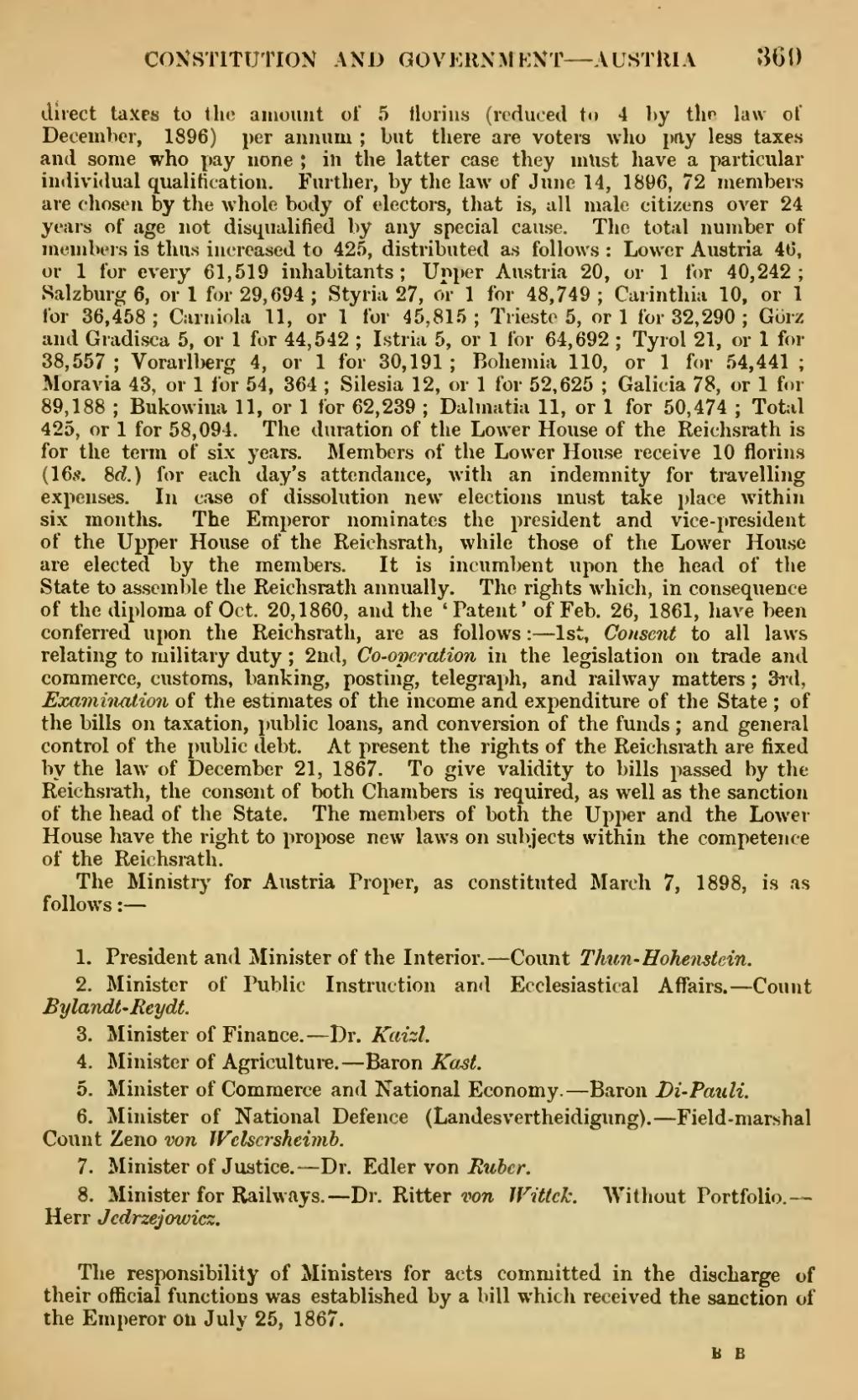CONSTITUTION AND GOVERNMENT — AUSTllIA 860
direct taxes to the aiuouut oi" 5 Uorius (reduced to 4 by tlm law of December, 1896) per annum ; but there are voters who pay less taxes and some who pay none ; in the latter case they mUst have a particular individual qualification. Further, by the law of June 14, 1896, 72 members are chosen by the whole body of electors, that is, all male citizens over 24 years of age not disqualified by any special cause. The total number of members is thus increased to 425, distributed as follows : Lower Austria 46, or 1 for every 61,519 inhabitants; Upper Austria 20, or 1 for 40,242; Salzburg 6, or 1 for 29,694 ; Styria 27, or 1 for 48,749 ; Cai-inthia 10, or 1 for 36,458; Carniola 11, or 1 for 45,815; Trieste 5, or 1 for 32,290 ; Gorz and Gradisca 5, or 1 for 44,542 ; Istria 5, or 1 for 64,692 ; Tyrol 21, or 1 for 38,557 ; Vorarlberg 4, or 1 for 30,191 ; Bohemia 110, or 1 for 54,441 ; Moravia 43, or 1 for 54, 364 ; Silesia 12, or 1 for 52,625 ; Galicia 78, or 1 for 89,188 ; Bukowiua 11, or 1 for 62,239 ; Dalmatia 11, or 1 for 50,474 ; Total 425, or 1 for 58,094. The duration of the Lower House of the Reichsrath is for the term of six years. Members of the Lower House receive 10 florins (16.S'. 8d.) for each day's attendance, with an indemnity for travelling expenses. In case of dissolution new elections must take place within six months. The Emperor nominates the president and vice-president of the Upper House of the Reichsrath, while those of the Lower House are elected by the members. It is incumbent upon the head of the State to assemble the Reichsrath annually. The rights which, in consequence of the diploma of Oct. 20,1860, and the 'Patent' of Feb. 26, 1861, have been conferred upon the Reichsrath, are as follows : — 1st, Consent to all laws relating to military duty ; 2nd, Co-omration in the legislation on trade and commerce, customs, banking, posting, telegraph, and railway matters ; 3i-d, Examhmtion of the estimates of the income and expenditure of the State ; of the bills on taxation, public loans, and conversion of the funds ; and general control of the public debt. At present the rights of the Reichsrath are fixed by the law of December 21, 1867. To give validity to bills passed by the Reichsrath, the consent of both Chambers is required, as well as the sanction of the head of the State. The members of both the Upper and the Lower House have the right to propose new laws on subjects within the competence of the Reichsrath.
The Ministry for Austria Proper, as constituted March 7, 1898, is as follows : —
1. President and Minister of the Interior. — Count Tlmn-Eohenstein.
2. Minister of Public Instruction and Ecclesiastical Affairs. — Count Bylandt'Reydt.
3. Minister of Finance. — Dr. Kaizl.
4. Minister of Agriculture. — Baron Kast.
5. Minister of Commerce and National Economy. — Baron Di-Pauli.
6. Minister of National Defence (Landesvertheidigung). — Field -marshal Count Zeno von JVclscrsheimh.
7. Minister of Justice. — Dr. Edler von ^wJcr.
8. Minister for Railway.s. — Dr. Ritter roTi WitteJ:. Without Portfolio.— Herr Jedrzejowicz.
The responsibility of Ministers for acts committed in the discharge of their official functions was established by a bill which received the sanction of the Emperor on July 25, 1867.
b B

